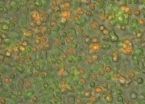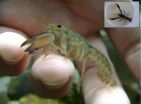Breast cancer cell subpopulation cooperation can spur tumor growth
2014-04-08
(Press-News.org) Subpopulations of breast cancer cells sometimes cooperate to aid tumor growth, according to Penn State College of Medicine researchers, who believe that understanding the relationship between cancer subpopulations could lead to new targets for cancer treatment.
Cancers contain genetically different subpopulations of cells, called subclones. Researchers have long known that these mutant subclones aggressively compete with one another to become the dominant tumor cell population. However, in some cases it seems that no single subclone can achieve dominance on its own.
"In breast cancer, there is remarkable genetic diversity within each cancer, and sometimes that diversity appears remarkably stable," said Ed Gunther, associate professor of medicine. "No single subclone seems to be capable of gaining the upper hand, leading us to wonder whether subclones might be working together in some instances. Cooperation between subclones could provide a stabilizing force that preserves tumor cell diversity."
The researchers studied mammary tumors in mice caused by the overproduction of a protein called Wnt1, which is secreted by tumor cells and is needed to advance tumor growth. They report their results in the current issue of Nature.
The mammary tumors frequently contained two distinct subclones – one produced Wnt1 while the other did not. The researchers observed a co-dependency of the two subpopulations. Instead of competing, the two relied on each other to expand both populations.
The subpopulation that failed to produce Wnt contributed to tumor growth with a mutation in a gene called HRas, which regulates cell division. The subpopulation that produced Wnt1 did not have this HRas mutation.
"One cell type signals to the other," Gunther said. "When one cell type produced Wnt1, which we know the tumor depends on, the other type sensed it."
When the researchers prevented the signaling between cells, the cancer growth stopped. However, the longer the messaging between the cells stops, the greater the chance that the cells will adapt.
"When we blocked the signaling, the cells got around it," Gunther said. "Either the cells evolved to find a way to communicate with each other again, or they evolved to not need the cooperation any longer."
Research could lead to effective ways to block communication between the cells to prevent the cooperation, and slow cancer growth. In addition, understanding the genetic differences between the subpopulations could lead to novel treatment strategies aimed at eliminating tumor cell communities.
INFORMATION:
Other researchers are Allison S. Cleary, M.D./Ph.D. program student, and Travis L. Leonard and Shelley A. Gestl, research technicians, all of Jake Gittlen Laboratories for Cancer Research at Penn State College of Medicine.
The National Institutes of Health/National Cancer Institute and the Mary Kay Foundation funded this research.
ELSE PRESS RELEASES FROM THIS DATE:
Tracking sugar movement in plants
2014-04-08
A new study published in the Proceedings of the National Academy of Sciences by scientists at the University of Queensland, Australia, overturns a long-held theory in plant science [see:http://www.bnl.gov/newsroom/news.php?a=11631]. Researchers at the U.S. Department of Energy's (DOE) Brookhaven National Laboratory who are co-authors on this paper conducted critical radiotracer studies that support the new theory that plant sugars play a dominant role in regulating branching at plant stems. While branching has relevance in agriculture, it is also very important in bioenergy ...
Dartmouth researchers identify potential therapeutic target for deadly brain cancer
2014-04-08
(Lebanon, NH, 4/8/14) Researchers from the Geisel School of Medicine at Dartmouth will present a scientific poster on Tuesday, April 8, 2014 at the American Association of Cancer Researchers conference in San Diego, CA. The research identifies a potential characteristic for predicting outcome in a deadly form of brain cancer known as glioblastoma multiforme.
Existing therapies based on genetic information have failed to effectively treat glioblastomas. Therefore, researchers are aggressively looking to find new molecular targets for this aggressive brain tumor.
Dartmouth ...
Novel plant biotechnology approach for sustainable production of pharmaceutical compounds
2014-04-08
European scientists have made ground-breaking discoveries for improving the efficiency of the production of pharmaceuticals through plant biotechnology. Biotechnological production offers a cost-effective and environmentally friendly alternative to the chemical synthesis of rare and complex pharmaceutical compounds currently isolated from plants. The results have been achieved in the European SmartCell project coordinated by VTT Technical Research Centre of Finland.
Several expensive anticancer alkaloid blockbusters used in chemotherapy, such as terpenoid indole alkaloids ...
New breast cancer results illustrate promise and potential of I-SPY 2 trial
2014-04-08
In an innovative clinical trial led by UC San Francisco, the experimental drug neratinib along with standard chemotherapy was found to be a beneficial treatment for some women with newly diagnosed, high-risk breast cancer.
Additionally, researchers learned that an algorithm used in the adaptive, randomized trial known as I-SPY 2 was highly effective at predicting the success of the treatment regimen in the patients who have HER2-positive/HR-negative disease.
The finding marks the second drug "graduation" within the I-SPY 2 trial model, which is designed to accelerate ...
Geography research could improve the effectiveness of hospital patient transport services
2014-04-08
University of Cincinnati research is offering hospitals and trauma centers a unique, accurate and scientific approach to making decisions about transporting critical-care patients by air or by ambulance. A presentation this week at the annual meeting of the Association of American Geographers (AAG) in Tampa, Fla., highlights the research of Michael Widener, a UC assistant professor of geography, along with Zac Ginsberg, MD, Maryland Shock Trauma Center; Samuel Galvagno Jr., assistant professor, Divisions of Trauma Anesthesiology and Adult Critical Care Medicine, Maryland ...
Grandmas stay sharp when they care for grandkids once a week
2014-04-08
CLEVELAND, Ohio (April 8, 2014)—Taking care of grandkids one day a week helps keep grandmothers mentally sharp, finds a study from the Women's Healthy Aging Project study in Australia, published online today in Menopause, the journal of The North American Menopause Society (NAMS). That's good news for women after menopause, when women need to lower their risks of developing Alzheimer's disease and other cognitive disorders.
On the other hand, taking care of grandchildren five days a week or more had some negative effects on tests of mental sharpness. "We know that older ...
Graphic photos on tobacco packs save lives: WHO report
2014-04-08
BEIJING, 8 April 2014 – Large, graphic health warnings on tobacco packets in China would increase awareness about the harms of smoking, help to cut smoking rates, and in doing so save lives according to global studies. These are the key findings from a new report, Tobacco health warnings in China – Evidence of effectiveness and implications for action, from the World Health Organization (WHO) and the International Tobacco Control Policy Evaluation Project (ITC Project), released today.
"This new report presents a very compelling case for the introduction of large, pictorial ...
A new tiny species of crayfish from the swamps of coastal eastern Australia
2014-04-08
Hidden in one of Australia's most developed and fastest growing areas lives one of the world's smallest freshwater crayfish species. Robert B McCormack the Team Leader for the Australian Crayfish Project described the new species belonging to the genus Gramastacus, after 8 years of research in the swamps and creeks of coastal New South Wales, Australia. The study was published in the open access journal ZooKeys.
Being a small crayfish species it has remained undescribed and undiscovered in one of the fastest developing regions of Australia. Only one other species of Gramastacus ...
Common diabetes treatment could extend hypoglycemia
2014-04-08
Researchers at the University of Adelaide have discovered that a common treatment for people with type 2 diabetes could cause longer-than-normal periods of the low blood sugar reaction hypoglycemia, which may result in increased health risks to people with diabetes.
The treatment is the use of the peptide GLP-1 (glucagon-like peptide 1) in combination with insulin, which is now used throughout the world as a standard therapy for patients with type 2 diabetes.
A team of researchers at the University of Adelaide's School of Medicine has investigated the impact of this ...
Good provider communication improves antidepressant adherence for diabetes patients
2014-04-08
OAKLAND, Calif., April 8, 2014 — Adult patients with diabetes who trust their medical provider and feel included in treatment decisions are significantly more likely to take and maintain a newly prescribed antidepressant medication, according to a new study in the Journal of General Internal Medicine.
The study, conducted by researchers at the Kaiser Permanente Division of Research and the University of Washington, School of Medicine, included 1,500 patients with long-standing diabetes, who were prescribed antidepressants.
"In patients with diabetes, depression has ...


